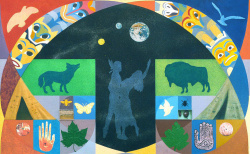In 20 years of his artistic career, Walter Miranda, has always worked with philosophical and conceptual questions even social as global. In this new series called: SEATTLE PROJECT: GAIA EXALTATION, the artist uses as theme the planet Earth, by the free pictorial representation of the answer letter of the native Chief Seattle (1790/1866) to Franklin Pearce, the USA president, offer to buy the native land in exchange of a reservation at 1855. The text is a work of great beauty, poetry and philosophy, which predicts the situation of ecological degradation of the Earth, being a pertinent literature today.
Gaia, in Greek, Earth in English, was the first primordial divinity of the Greek theogony, after the chaos. From her everything begins, since her natural forces which are mythological represented by her children, until the creatures that live and depend on her, animals and plants. In this sense, the theme, Gaia Exaltation, becomes clear when we realize the presence of the planet image, in all works exhibited, at distintive conceptual circunstances.
Walter makes construtivists compositions by the Golden Section, which is a mathematical relation observed in many creations of the nature and present on the ancient mathematical studies. At the same time he eliminates the geometrical rigidity of the compositions creating an organic relationship of the spaces through the logarithmic spiral. The conjunction of the compositive lines propitiates figurative forms which are integrated to the theme by the artist in a realistic or estylized way. Using the traditional technique of oil painting, he takes textures and peculiar visual effects from the overlaps of sprinkled, wrinkled paint layers and abstract strokes whose are applied in the background and in the extrude figures, that were drawn in cardboard, cut and glued on the works during the compositional process.
Through the incorporation of computers circuit boards (some sawed and others ground by emery to get geometrical and figurative forms like locomotives, trees, human, etc.), chips, batteries and many elements of our technological nowadays, besides nature elements, like seeds, leaves, ground, ashes, etc., Walter, illustrates in a simbolic manner the current dichotomy of nature versus the inconsequent use of the technology provoquing reflections about the environment question, the performance of the Man in the planet and the responsability on this ecological llegacy, as we observe in the work where he incorporates a glass with pure water (taken from the Tiete river's beggining) and other with polluted water (taken from the same river but in Sao Paulo downtown). Besides that, repeating some images like the Earth, ballerinas, children, and others, the artist creates a repertory that gives emphasis to a universe of meanings that has no intention to transmit decoded messages to the spectator, since the utilization of these elements as details, or foreground, obligates the spectator to examine the metonymic relations of each element provoquing him questions, in order to reach his own conclusions about the theme. The outcome is the complicit or the denial, because both are the two sides of the same coin.
The artist, therefore, looks for linking the reason to the sense, the basis of his creative process. The outcome is a work with totally new style, although based on traditional techniques, seeks its overcome and transformation and, because of that, has deep roots on history, culture and artistic language (as observed a Brazilian poetry, Ferreira Gullar), where the style is identificable by the compositive conception, and the technique (variable) is only a mere instrument. As wrote Kandinsk: "The artist must have something to say, for mastery over form is not his goal but rather the adapting of form to its inner meaning."
